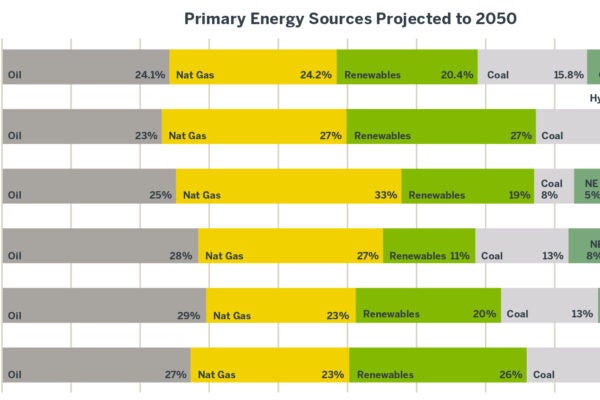Less is More
For consumers who aim to shop based on their values or political beliefs, deciding what products are safe to buy isn’t easy
By Jeremy Simon

Store shelves are full of rows upon rows of products, and online retailers offer even more. How do you know which items to choose? According to business researchers, tracking down the relevant information isn’t something consumers often can — or want — to do.
That’s why they recommend another approach: Buy less stuff.
“Not consuming is probably a better choice in terms of the environment and whatever values you might have,” says Julie Irwin, professor of Business, Government, and Society at the McCombs School of Business, who studies consumer choices. Her upcoming research will consider why consumers think buying certain products better expresses their values than simply not buying.
“When you’re voting or picking a charity, you think about your values,” Irwin says. “But when you’re shopping, I think most of us don’t as much.”
Willful Ignorance
Consumers are already creating mountains of waste. For example, from clothing, footwear, accessories, and other textiles alone, 21 billion pounds of post-consumer waste ends up in U.S. landfills each year, according to the nonprofit Council for Textile Recycling.
So why not learn to shop more selectively?
For one thing, consumers are not always interested in knowing where their products come from. Irwin has found that while consumers will use information on company ethics when it’s given to them, they won’t seek it out. In one study, Irwin had 182 subjects consider buying a wooden desk and chair set based on four attributes: workmanship, comfort, type of wood, and price. Shoppers who placed higher importance on whether the wood was harvested from a rainforest were more likely to use that information when it was already available. But if they had to request that information? Not so much.
Consumers avoid seeking that information, according to her research, because not knowing the truth of the unethical origins of their purchases reduced their feelings of anger and sadness about the consequences of their decisions.
That’s why consumers so often shop blindly.
“They may not have the information, and it stresses them out too much to go find it,” Irwin says. “So there’s all this willful ignorance that looks like people don’t care. They do — they almost care too much. It freaks them out too much to even think about it.”
Boycotts and Dark Money
Among that information, finding facts about a company’s political involvement may be tough to suss out. That can be the result of a company’s prior misdeeds and the resulting consumer backlash.
McCombs Professor Timothy Werner, also of the BGS Department, has researched consumer boycotts. In a 2014 paper, Werner examined articles from the six largest U.S. newspapers from 1990 to 2007 for use of the word “boycott” and its derivatives. He and his co-author identified 203 publicly listed firms that had been the target of organized boycotts. The result: Tainted firms had their donations given back by politicians eager to distance themselves from the negative publicity.
Werner found that as a boycott fades from public attention, corporations may then engage with politicians more covertly. For example, companies may employ lobbying efforts or so-called dark money, funds given through nonprofits that aren’t required to disclose their donors.
“The politician and the firm basically know it’s continuing, whether it’s through lobbying or dark money in the electoral process, but the public doesn’t see it,” Werner says. Shoppers, therefore, may end up supporting companies that in turn give to politicians they’d never condone in the light of day.
Werner recommends visiting the website for the Center for Responsive Politics to track corporate dollars in politics.
To Buy or Not to Buy
But even though it’s tough to be an ethical shopper, experts suggest there’s still reason to try.
“It’s really hard to detect all of the ripple effects that your purchases could make,” says Robert Prentice, professor and department chair in the Business, Government, and Society Department at McCombs and faculty director for the Ethics Unwrapped educational video series. “I do think that a thoughtful person who wants to live a good life they can be proud of should have at least basic awareness of the impacts that their purchasing decisions have.”
That can include not buying new things. Rather than consuming more new items, Irwin instead recommends buying used or sharing already-purchased items among friends.
“To the extent we can reuse things and don’t use up new resources, I think that helps preserve resources for those future generations,” Prentice says.
Of course, sometimes people need to buy new. Treasured items break. New models of our household appliances become more eco-friendly.
Irwin, meanwhile, suggests shoppers visit stores that place a value on ethics, such as groceries that emphasize local, seasonal, and organic produce or clothing retailers that sell products built to last from environmentally sustainable products.
“Consumers will have the confidence knowing that anything they buy within that place will be okay,” she says. “They don’t have to keep making decisions over and over again.”
About this Post
Share:


